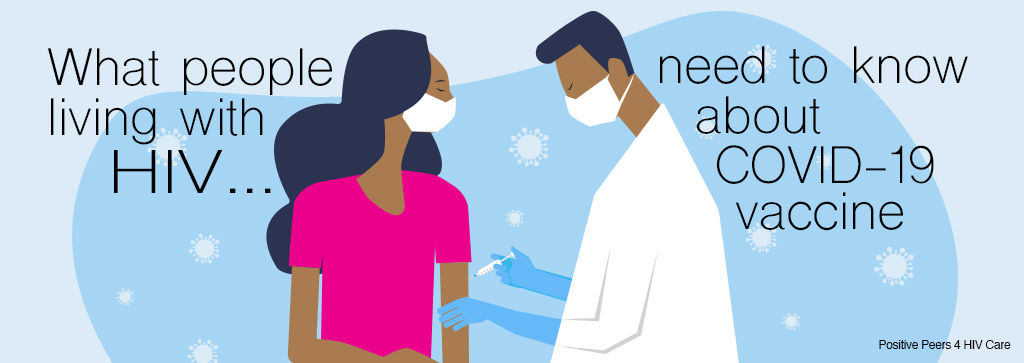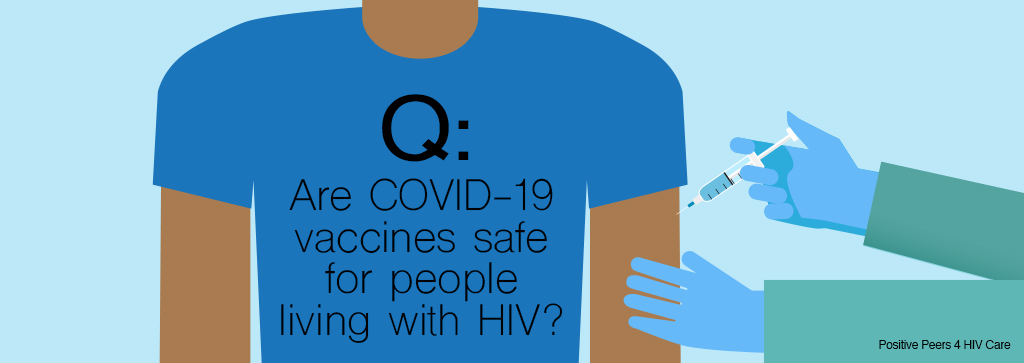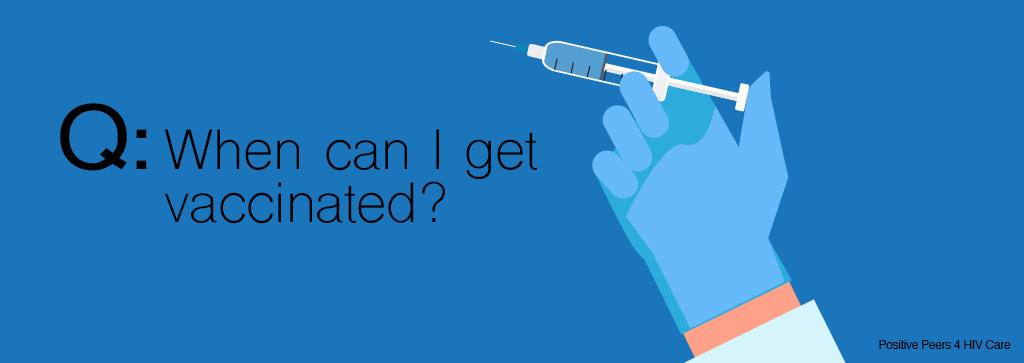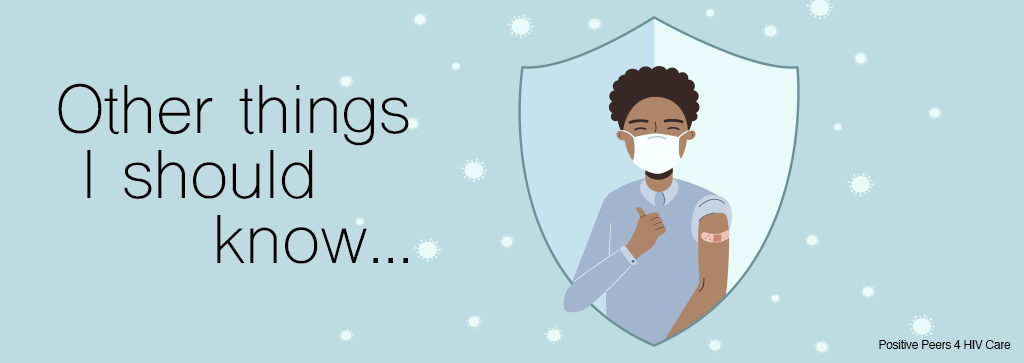
By: Ann K. Avery, MD, Infectious Disease Physician at MetroHealth Medical Center
So, the vaccine is out and slowly being distributed to folks. Your first question that probably comes to mind is: Is it safe for me? 🤔 😓
In short: YES!!! Absolutely! 👏🏾
COVID-19 vaccines that are authorized for emergency use, such as the vaccines made by Pfizer and Moderna, are considered as safe for most people living with HIV as they are for the general population.
Go ahead and do your happy dance! 💃🏿 We’re celebrating with you! 🎉 We have some additional information you should know about the vaccine, so keep reading and share this blog with other friends!
Well-respected HIV physicians, like Monica Gandhi, MD, MPH, Medical Director of the Ward 86 HIV Clinic at Zuckerberg San Francisco General Hospital, and Ann K. Avery, MD, Director of MetroHealth Medical Center’s Infectious Disease Division, think people living with HIV should be vaccinated against COVID-19 and encourage their patients with HIV, especially those on HIV medicine, to get a vaccine when it is available to them.

Is the COVID-19 vaccine safe for people living with HIV?
Yep! 👏🏾
- Because COVID-19 vaccines aren’t live vaccines – they’re mRNA vaccines that deliver tiny bits of genetic material that encode instructions for making the SARA-CoV-2 spike protein, which the coronavirus uses to enter cells. The vaccine basically gives your cells a blueprint of how to make antibodies against COVID-19. There is NO WAY the vaccine can cause COVID-19, even in immunocompromised people.
- Because they were tested on people living with HIV (PLWH) too! The Pfizer trial included 120 PLWH, Moderna trials included 176 PLWH. No unusual safety concerns were reported for PLWH. Other vaccines being studied, including those by AstraZeneca (160 PLWH enrolled), Johnson & Johnson, Novavax, and Sanofi/GSK also include PLWH (fun fact, most of those companies also make HIV drugs, so of course they will include people living with HIV in their trials).
When can I get vaccinated?
- If you are 50 or older you can try to find a place to get vaccinated now. Start with your local city or county health department’s website, and also check your local drug stores. Please keep in mind that depending on where you live, age requirements may vary.
- People living in Cleveland can check here: https://www.ccbh.net/vax/.
- If you have access to your medical record through an app, like MyChart, your healthcare provider is likely to send you a message there when it is your turn to be vaccinated.
- If you are 16 – 64, it’s going to be a little while before you can get vaccinated, unless you have something that prioritizes you, like an underlying medical condition, which increases the risk of serious, life-threatening complications from COVID-19 (like diabetes, chronic lung disease, or a history of cancer) or your job puts you at risk (like healthcare worker, teacher, or police officer). BUT…President Biden said his goal is that all adults who want a vaccine will be eligible by May 1, 2021! 🎉
- There are some advocacy efforts happening on a national level to prioritize people living with HIV to get vaccinated in priority group 1C – those with pre-existing conditions. The State of Tennessee recently included people living with HIV of ALL AGES in group 1C, but this is decided on a state-by-state basis. You can learn more about HIV and COVID-19 here: https://www.cdc.gov/coronavirus/2019-ncov/need-extra-precautions/hiv.html
- We also recommend this article, https://www.thebody.com/article/covid-19-vaccine-people-living-with-hiv, which discusses how PLWH who are on meds and undetectable are at the same risk of severe illness from COVID-19 as those who don’t have HIV, but people who have a very low CD4 count and those not on HIV medicine are at an increased risk for severe disease. This means there might be different vaccine recommendations for those two groups of people living with HIV.
Other things you should know:
- People have the most protection from COVID-19 two weeks after completing all vaccine doses.
- The CDC updated their guidelines for what fully vaccinated people are safe to do on 3/8/2021. If you’ve been fully vaccinated, and it’s at least 2 weeks since your final dose, you can:
- Gather indoors with other fully vaccinated people without wearing a mask.
- Gather indoors with unvaccinated people from ONE other household, without masks, unless someone from that household has an increased risk for severe illness from COVID-19.
- You should still wear a mask and distance in public.
- Remember, COVID-19 is still a brand-new disease and researchers are working hard to learn as much about treatments and prevention as possible. As science changes, we can expect public health recommendations to also change. You should try to keep up-to-date on COVID-19 information through reputable sources, such as the CDC or your state’s health department. Ohio’s COVID-19 information can be found here: https://coronavirus.ohio.gov/wps/portal/gov/covid-19/covid-19-vaccination-program
What to know if you get a Pfizer Vaccine:
- You must be at least 16 years old
- You will get 2 doses, about 3 weeks (21 days) apart
- Your arm will be sore, maybe even swollen and red
- After the second dose, you may have symptoms such as fever, fatigue, headache, chills, and body aches that are mild to moderate in severity. They typically resolve within 1-3 days of the vaccination.
What to know if you get a Moderna Vaccine:
- You must be at least 18 years old
- You will get 2 doses, about 4 weeks (28 days) apart
- Your arm will be sore, maybe even swollen and red
- After the second dose, you may have symptoms such as fever, fatigue, headache, chills, and body aches that are mild to moderate in severity. They typically resolve within 1-3 days of the vaccination.
What to know if you get a Johnson & Johnson Vaccine:
- You must be at least 18 years old
- You will get 1 dose
- Your arm will be sore, maybe even swollen and red
- You may have symptoms such as tiredness, headache, fever, chills, and body aches that are mild to moderate in severity. They typically resolve within 1-3 days of the vaccination.

